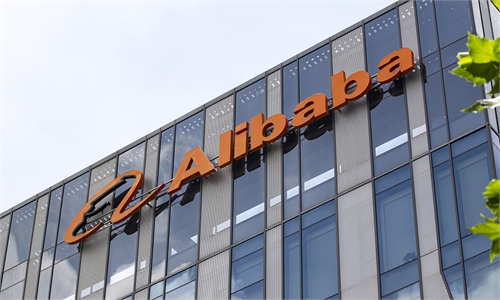Alibaba shares close 6.51% higher at HK stock market, as company vows to ramp up compliance

Alibaba photo:IC
Alibaba shares rallied at the Hong Kong stock market on Monday after its management assured investors of merchant-oriented commitments in response to a record $2.8 billion antimonopoly fine by the regulator over the weekend.
Market analysts expect Alibaba to focus its efforts to seek new profit levers as its e-commerce business growth will likely slow down.
Alibaba shares opened 5.5 percent higher on Monday in Hong Kong, which closed up 6.51 percent on Monday, despite a 0.86 percent decline in the Hang Seng Index. Alibaba's American depository receipts also gained in premarket reading on Monday.
The Chinese e-commerce giant's stock had kept declining since it was hit by the regulator's anti-trust probe. The Monday rally was indicative of a compensatory mode as the bad news have run their course, Liu Dingding, an independent tech analyst, told the Global Times.
In a statement on Saturday, the State Administration for Market Regulation (SAMR), the regulator, said Alibaba abused its market dominance to subject vendors on its platform to a coerced pick of one out of two platforms since 2015, which breached the country's Anti-Monopoly Law.
The fine accounts for 4 percent of the company's domestic revenues in 2019, the largest anti-monopoly fine ever handed out by the regulator.
The penalty decision was the result of an investigation that began in December 2020, relating to activities that would be prohibited under the Anti-Monopoly Law specifically under article 17, clause four of the law that a business operator that has a dominant market position is prohibited from restricting competitors by requiring exclusive arrangements without justifiable cause, Joe Tsai, the executive vice chairman of Alibaba, said in opening remarks at a conference call on Monday.
He put in perspective that under the Anti-Monopoly Law, monetary penalty of up to 10 percent of revenues can be imposed at the discretion of the authorities.
The penalty decision described the results of SAMR investigation, and concluded that Alibaba was in violation of article 17, clause four of the law. As a result, Alibaba as a platform operator shall not restrict merchants from doing business or running promotions on competitors' platforms.
As the operator of China's largest e-commerce platform, Alibaba has hundreds of millions of users and millions of merchants, and it doesn't rely on exclusivity to retain its merchants, Alibaba Chairman and CEO Daniel Zhang said at the conference call.
"If you look at the exclusivity arrangement before, I would say this only covered a number of Tmall flagship stores, which [are] directly operated by brands. But actually, today, all the merchants have multi-platform strategies ... business-wise, we don't expect material negative impact on the change of this arrangement."
Alibaba will continue to introduce new measures to lower the entry barriers and business costs for merchants on its platform, Zhang stated.
Over the past few months, the company has waived technology service fees in line with previous practices, he revealed, and over years more mature services will be available at no cost.
"We're going to both reduce fees and charges to help merchants and brands invest and spend more . ... overall, we have reserved billions of yuan in additional annual spending to support initiatives in the future year," Maggie Wu, Alibaba's chief financial officer, said.
The antitrust fine will be reflected in the March quarter, according to Wu.
The penalty is equivalent to less than 20 percent of the free cash flow of Alibaba in the latest 12 months, Tsai revealed, adding "we will pay this penalty out of our available liquidity, which as of December 31, 2020, stood at approximately $70 billion in cash, cash equivalent and short term investments."
Reiterating Alibaba's public statement on Saturday that it accepts the penalty with sincerity and would ensure its compliance with determination, Tsai said "we do not plan to appeal the penalty decision."
The penalty would inevitably weigh on Alibaba's e-commerce growth, industry observers said, expecting greater diversification efforts on the part of Alibaba and its e-commerce rivals to get a boost from regulatory ban on limiting merchants' choices between platforms.
Cloud services, logistics and a chip push by its DAMO Academy may become Alibaba's new growth points, Liu said.
Alibaba will have to make more efforts to align itself with a broad-based effort to ensure fair competition in the platform economy as unchecked expansion of internet giants hampers the growth of brick-and-mortal retailers and smaller innovative businesses, an industry observer told the Global Times on Monday on condition of anonymity.
More regulatory penalties are likely in the pipeline to target other dominant platforms in the country, as part of a sweeping move to encourage fairer and more sustainable economic growth, noted the observer.

